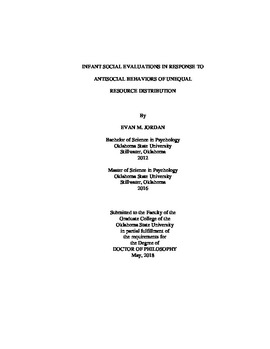| dc.contributor.advisor | Thomas, David G. | |
| dc.contributor.author | Jordan, Evan M. | |
| dc.date.accessioned | 2019-03-20T18:35:43Z | |
| dc.date.available | 2019-03-20T18:35:43Z | |
| dc.date.issued | 2018-05 | |
| dc.identifier.uri | https://hdl.handle.net/11244/317606 | |
| dc.description.abstract | At the most basic level, a prosocial behavior is any voluntary behavior of which the main purpose is to benefit another individual (Eisenberg & Fabes, 1998; Krebs, 2015), but does not provide benefit to the acting individual. Healthy emotional development provides a foundation for the development of prosocial motives and their subsequent behaviors, especially those emotions specifically related to empathic responding. Empathy, an affective response involving the sharing and understanding of the emotions of another, is considered a primary motive for the emergence of prosocial behaviors. Precursors of both empathic and prosocial responding are evident within the first year and even the first months of life and continue to strengthen and increase in complexity across infancy and early childhood. | |
| dc.description.abstract | Previous research has demonstrated a preference for individuals who behave prosocially, as opposed to antisocially, in infants as young as 3 months of age (Hamlin et al., 2010). It has also been suggested that by 18 months of age infants may be evaluating the equitable and inequitable distributive actions of others as being either prosocial or antisocial behaviors, respectively (Geraci & Surian, 2011). This previous work has focused exclusively on the agents of the distributive actions. The purpose of the current study is to focus on the recipients of those actions, i.e., to determine if infants engage in social evaluations directed toward the individuals who are on the receiving end of prosocial and antisocial distributive behaviors. Specifically, this study assesses infant responses toward receivers that have been treated antisocially to determine if infants are displaying an empathically charged response toward individuals affected by antisocial actions. | |
| dc.format | application/pdf | |
| dc.language | en_US | |
| dc.rights | Copyright is held by the author who has granted the Oklahoma State University Library the non-exclusive right to share this material in its institutional repository. Contact Digital Library Services at lib-dls@okstate.edu or 405-744-9161 for the permission policy on the use, reproduction or distribution of this material. | |
| dc.title | Infant social evaluations in response to antisocial behaviors of unequal resource distribution | |
| dc.contributor.committeeMember | Byrd-Craven, Jennifer | |
| dc.contributor.committeeMember | Grice, James W. | |
| dc.contributor.committeeMember | Stoecker, Barbara J. | |
| osu.filename | Jordan_okstate_0664D_15732.pdf | |
| osu.accesstype | Open Access | |
| dc.type.genre | Dissertation | |
| dc.type.material | Text | |
| thesis.degree.discipline | Psychology | |
| thesis.degree.grantor | Oklahoma State University | |
